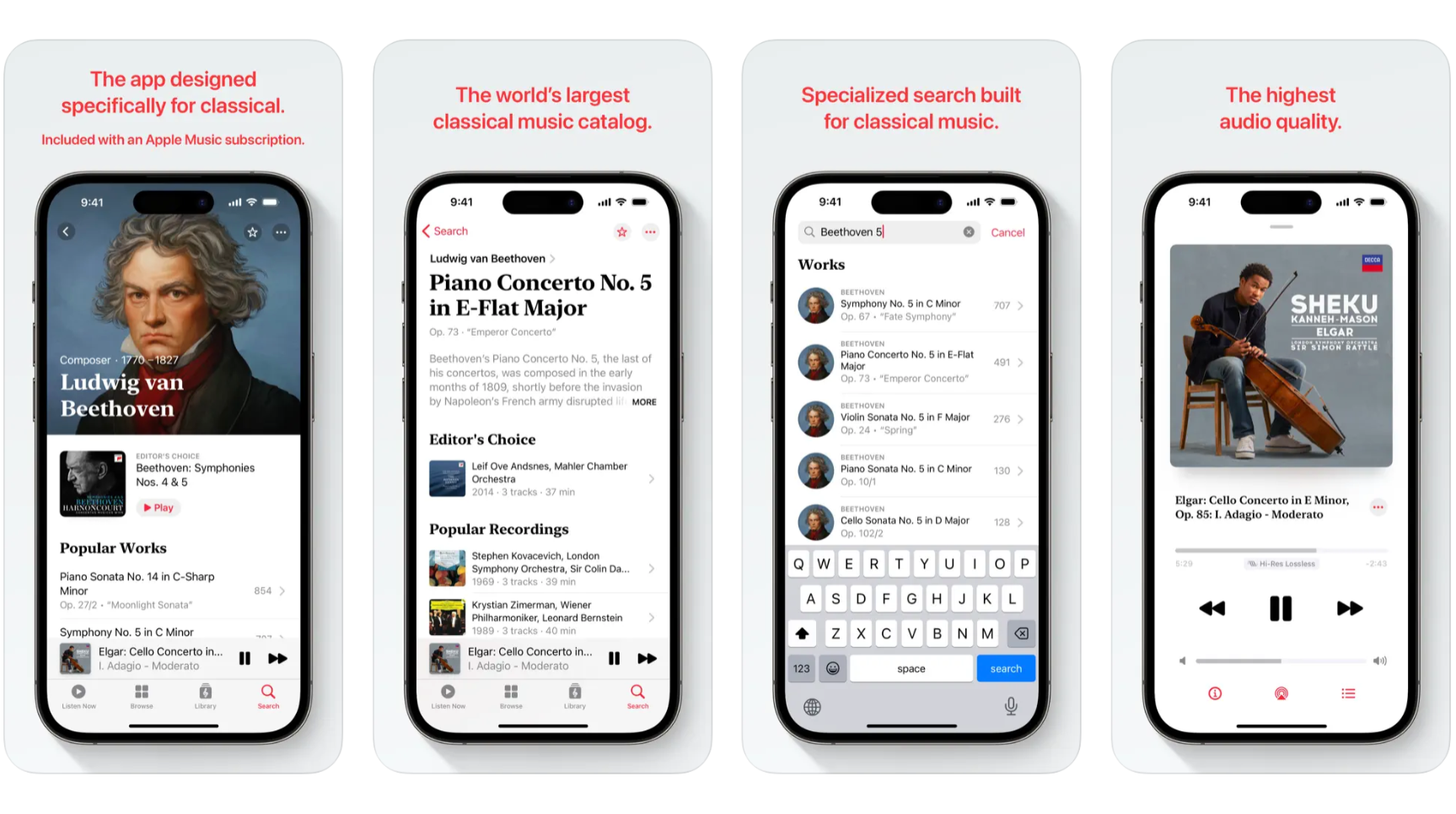
Streaming services and classical music aren't necessarily the two things you'd most closely associate with one another. Online streaming platforms such as Spotify, Apple Music and even Tidal remain strongly associated with ideas of youth-oriented fare and the modern desire for convenience and usability over anything else, while Qobuz takes a stab at it in delivering a decent amount of classical works in hi-res audio.
Classical music inherently has a more 'traditional' association. However erroneous it might be, such music remains tied up with images of old record players, gramophones, philharmonic orchestras and your dad's obsession with Classic FM and BBC Radio 3.
The reality, however, is that with streaming's increasing ubiquity across generations and tastes, combined with some serious recent leaps in audio quality and methods of presentation, such services are better equipped than ever to serve the classical market. Thanks to innovations such as lossless audio, hi-res streaming and Dolby Atmos, never has network streaming been better equipped to deal with the demands of Brahms, Beethoven and Berlioz.
It's no surprise, then, that Apple Music is planning to launch its own bespoke classical music service, imaginatively titled Apple Music Classical, designed specifically to deal with the demands of classical music. Ever since Apple acquired streaming service Primephonic in 2021, there have been hints of a dedicated Apple service for the genre. And we now finally have all the details concerning the tech giant's plans for its new home of all things classical.
What is Apple Music Classical?
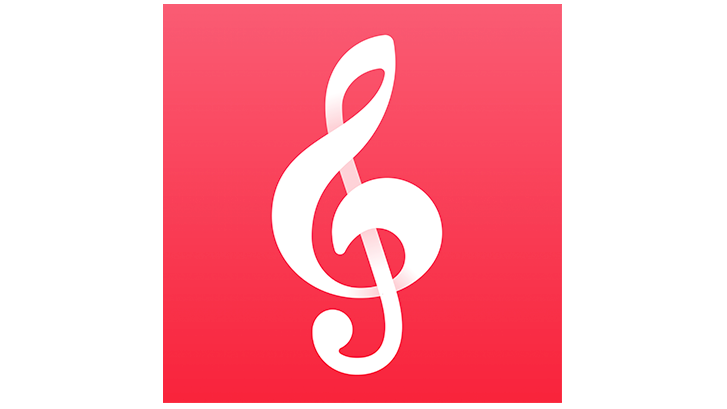
Apple teases its new service as being designed "specifically for classical music", available to current Apple Music subscribers "at no additional cost". The new platform is set to run in parallel with Apple Music, but with its own app that can be downloaded separately for free. It is laid out specifically to accommodate the intricacies, and often complexities, inherent in searching for the many variations, recordings and arrangements floating around the classical music-sphere.
Apple Music Classical provides subscribers with unlimited access to what Apple deems the "world’s largest classical music catalogue" of over five million tracks including thousands of exclusive albums. Users can navigate more effectively through the archive by searching by composer, work, conductor or catalogue number to find the specific recording they want.
Release date
Apple Music Classical is available now on the App Store. Incidentally, its launch date of 28th March is the same day the new Sonos Era 300 smart speaker goes on sale, which will also start supporting Apple Music's spatial audio tracks on that day. How convenient...
You'll need to download the free Classical app separately to the main Apple Music app.
Pricing
Apple Music Classical comes at no extra cost to current Apple Music users, provided they have the full £10.99 / $10.99 / AU$12.99 membership already or the Student of Family plan (the cheaper Voice Plan will not suffice). Just download the separate Apple Music Classical app and you should be good to go with your existing subscription.
What if you don't already subscribe to Apple Music? Sadly, there's no option for a standalone subscription right now, so if you want to hear the Liszt in lossless or Haydn in hi-res, you're going to have to subscribe and pay a membership price to the full Apple Music service to use the Classical app.
The app will work on Apple devices with iOS 15.4 and later, but you'll have to find a pair of compatible headphones (such as the AirPods Pro 2) and/or speakers (the HomePod 2 and Sonos Era 300, for instance) to really benefit from the Hi-Res Lossless and spatial audio formats.
Hi-res lossless and spatial audio
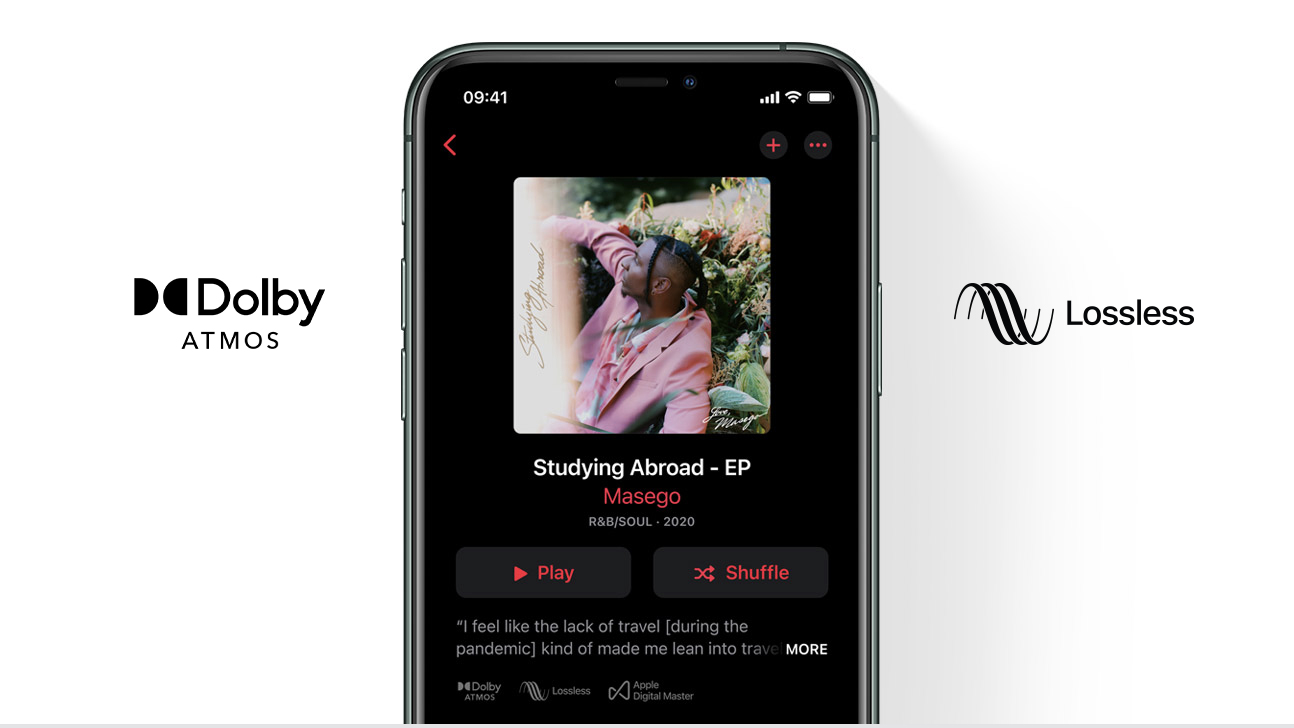
And the good news continues: the Classical music library has over five million tracks already (joining Apple Music's over 100-million strong catalogue), and will feature songs available in up to 24-bit/192kHz Hi-Res Lossless quality (the highest Apple offers) and also in spatial audio with Dolby Atmos.
Again, make sure your headphones or speakers are actually equipped to deal with Hi-Res Lossless and/or spatial audio, otherwise you're simply not going to get the full benefit of these nifty additional features.
Catalogue and features

The provision of millions of highest audio quality, up to 24-bit/192kHz Hi-Res Lossless classical tracks, as well as thousands of Dolby Atmos-compatible recordings, are obviously two of the big draws here, especially when you consider just how impressive something like a Beethoven symphony could sound with the full Dolby experience behind it. There's also the capacity to stream the app's library using AirPlay on compatible wireless devices.
Similarly, the five million+ tracks and recordings are a huge draw, with "complete and accurate metadata" provided for those of us who like to know the nitty-gritty specifics of who, and what, is being played to us, bolstered by thousands of composer biographies and descriptions of key works and pieces. "Intuitive browsing features", meanwhile, promise to make navigating the weird and wonderful world of classical music a far less stressful experience.
According to Apple, the Classical app "makes it easy for beginners to get acquainted with the genre thanks to hundreds of Essentials playlists, insightful composer biographies, deep-dive guides for many key works, and intuitive browsing features."
Where can you buy / download the app?
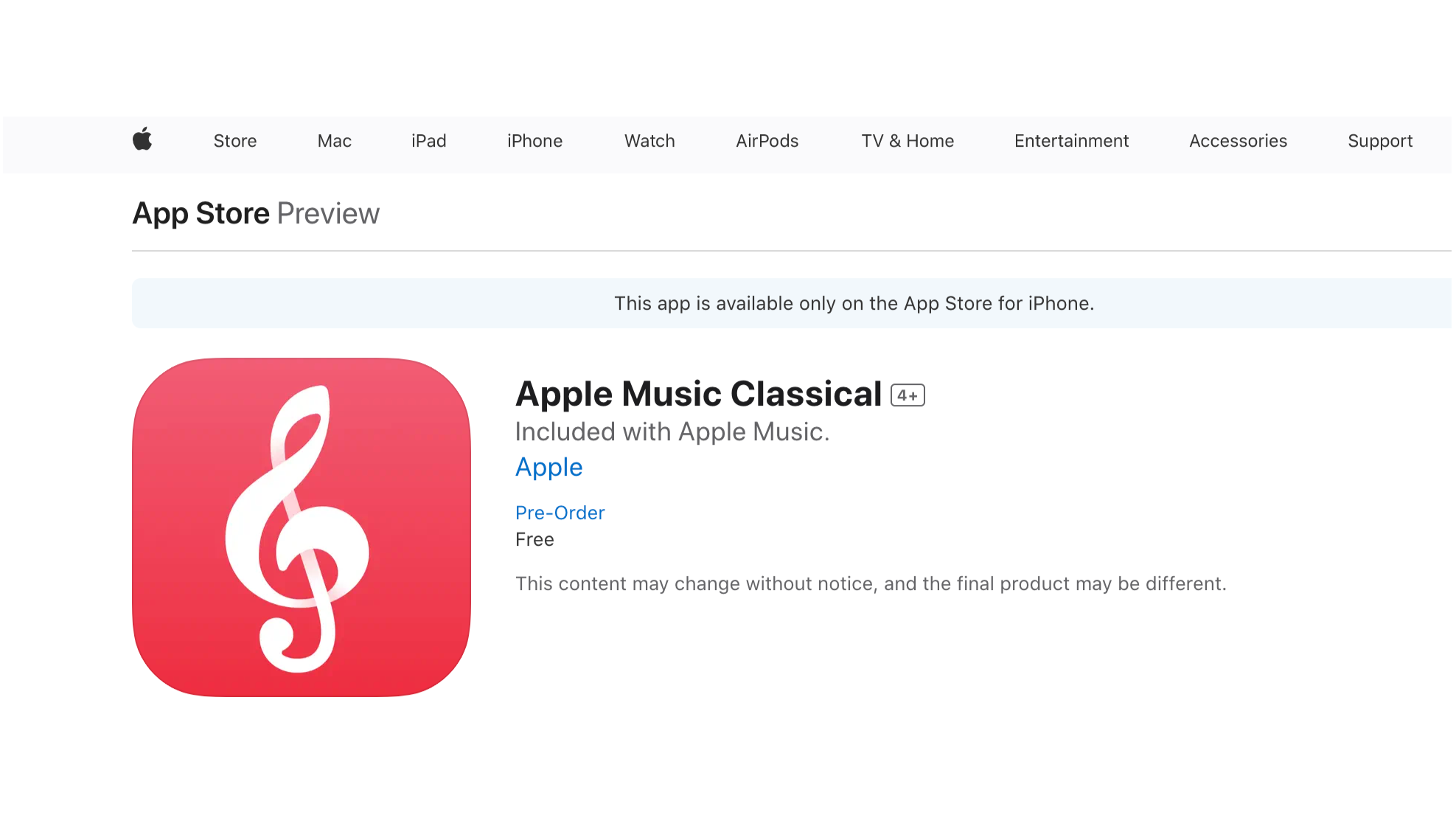
Apple users can order Apple Music Classical right now via the official App Store .
Sadly, the news isn't so good for Android users. While Apple Music is available via the Google Play Store, there's no sign of Classical there yet. We're anticipating the new Classical app to be made available for Android users at a later date, pending official confirmation.
What about previous Primephonic subscribers?
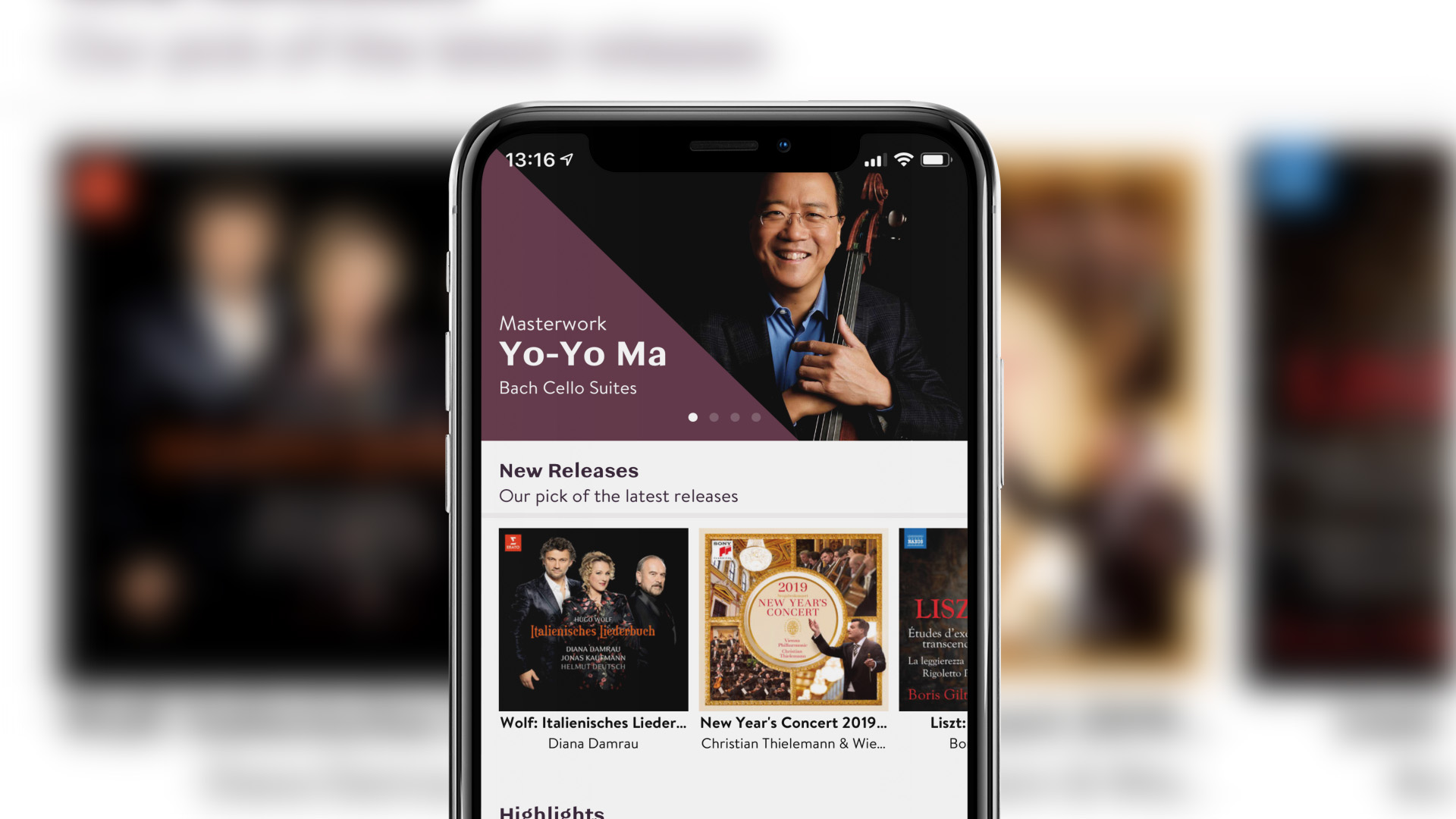
Since Apple's acquisition of Primephone in late summer 2021, Primephone has closed down and stopped accepting new members. At the time, existing subscribers to Primephone were offered a pro-rata refund and six months of Apple Music for free. Those that carried on with the Apple Music subscription will also be able to download the new Classical app at no additional cost.
MORE:
Apple Music Classical will launch on 28th March with hi-res and spatial audio
Read our five-star Apple Music review
And our five-star Sonos Era 300 review
Apple spatial audio: what is it? How do you get it?
Apple Music lossless: which devices will (and won't) play lossless and Spatial Audio







